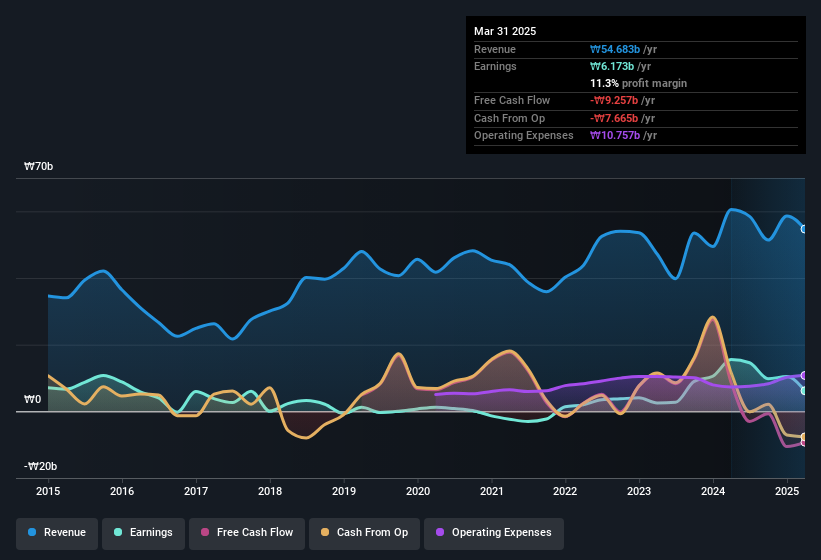- South Korea
- /
- Communications
- /
- KOSDAQ:A211270
Asia Pacific Satellite's (KOSDAQ:211270) Shareholders Have More To Worry About Than Only Soft Earnings
The subdued market reaction suggests that Asia Pacific Satellite Inc.'s (KOSDAQ:211270) recent earnings didn't contain any surprises. However, we believe that investors should be aware of some underlying factors which may be of concern.
Our free stock report includes 2 warning signs investors should be aware of before investing in Asia Pacific Satellite. Read for free now.
Examining Cashflow Against Asia Pacific Satellite's Earnings
One key financial ratio used to measure how well a company converts its profit to free cash flow (FCF) is the accrual ratio. The accrual ratio subtracts the FCF from the profit for a given period, and divides the result by the average operating assets of the company over that time. The ratio shows us how much a company's profit exceeds its FCF.
That means a negative accrual ratio is a good thing, because it shows that the company is bringing in more free cash flow than its profit would suggest. That is not intended to imply we should worry about a positive accrual ratio, but it's worth noting where the accrual ratio is rather high. Notably, there is some academic evidence that suggests that a high accrual ratio is a bad sign for near-term profits, generally speaking.
For the year to March 2025, Asia Pacific Satellite had an accrual ratio of 0.76. As a general rule, that bodes poorly for future profitability. And indeed, during the period the company didn't produce any free cash flow whatsoever. Even though it reported a profit of ₩6.17b, a look at free cash flow indicates it actually burnt through ₩9.3b in the last year. We saw that FCF was ₩8.6b a year ago though, so Asia Pacific Satellite has at least been able to generate positive FCF in the past.
That might leave you wondering what analysts are forecasting in terms of future profitability. Luckily, you can click here to see an interactive graph depicting future profitability, based on their estimates.
Our Take On Asia Pacific Satellite's Profit Performance
As we discussed above, we think Asia Pacific Satellite's earnings were not supported by free cash flow, which might concern some investors. For this reason, we think that Asia Pacific Satellite's statutory profits may be a bad guide to its underlying earnings power, and might give investors an overly positive impression of the company. But the good news is that its EPS growth over the last three years has been very impressive. Of course, we've only just scratched the surface when it comes to analysing its earnings; one could also consider margins, forecast growth, and return on investment, among other factors. In light of this, if you'd like to do more analysis on the company, it's vital to be informed of the risks involved. Case in point: We've spotted 2 warning signs for Asia Pacific Satellite you should be mindful of and 1 of them doesn't sit too well with us.
Today we've zoomed in on a single data point to better understand the nature of Asia Pacific Satellite's profit. But there are plenty of other ways to inform your opinion of a company. Some people consider a high return on equity to be a good sign of a quality business. While it might take a little research on your behalf, you may find this free collection of companies boasting high return on equity, or this list of stocks with significant insider holdings to be useful.
New: Manage All Your Stock Portfolios in One Place
We've created the ultimate portfolio companion for stock investors, and it's free.
• Connect an unlimited number of Portfolios and see your total in one currency
• Be alerted to new Warning Signs or Risks via email or mobile
• Track the Fair Value of your stocks
Have feedback on this article? Concerned about the content? Get in touch with us directly. Alternatively, email editorial-team (at) simplywallst.com.
This article by Simply Wall St is general in nature. We provide commentary based on historical data and analyst forecasts only using an unbiased methodology and our articles are not intended to be financial advice. It does not constitute a recommendation to buy or sell any stock, and does not take account of your objectives, or your financial situation. We aim to bring you long-term focused analysis driven by fundamental data. Note that our analysis may not factor in the latest price-sensitive company announcements or qualitative material. Simply Wall St has no position in any stocks mentioned.
About KOSDAQ:A211270
Asia Pacific Satellite
Develops and manufactures satellite communication devices worldwide.
Flawless balance sheet with questionable track record.
Market Insights
Community Narratives




